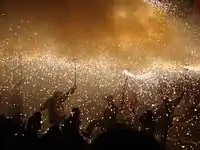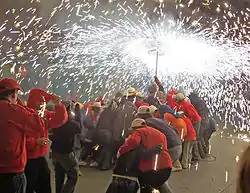Correfoc
Correfocs (Catalan pronunciation: [ˌkorəˈfɔks]); literally in English "fire-runs") are among the most striking features present in Valencian and Catalan festivals. In the correfoc, a group of individuals will dress as devils and light up fireworks – fixed on devil's pitchforks or strung above the route. Dancing to the sound of a rhythmic drum group, they set off their fireworks among crowds of spectators. The spectators that participate dress to protect themselves against small burns and attempt to get as close as possible to the devils, running with the fire. Other spectators will watch from "safe" distances, rapidly retreating as necessary.[1][2]
| The Catalan / Valencian cultural domain |
|---|
 |

The correfoc can come in many forms. Some are simple parades using fireworks and effigies of the devil. In Sitges, it is common for a crowd to line a street, while participants run through a tunnel of fireworks. Correfocs are run during the Festival of La Mercè in Barcelona,[1] the Festival of Santa Tecla in Tarragona[3] and the Festival of Saint Narcissus in Girona.[4]
Another typical Catalan folkloric expression of this sort takes place in L'Arboç. The highlight of the village's feast is the Carretillada. In the evening of the feast day, the town square is made to look like Hell. For nearly half an hour, "devils" burn their carretilles (carts), jumping around ceaselessly, while a large "sceptre of Lucifer" and the "pitchfork of the Diablessa (she-devil)" shoot fire-jets and other pyrotechnics. Every year, the carretillada is a bit different, because the 'colla' (group) does not give up novelties that are added each year to add to the spectacle.
See also
References
- "Correfoc | Cultura Popular". Barcelona City Council. Retrieved 2020-09-05.
- Jessop, Tara. "Everything You Need To Know About The Catalan Correfoc". Culture Trip. Retrieved 2020-09-05.
- "El Correfoc pone punto final a las fiestas de Santa Tecla más reivindicativas". Diari de Tarragona (in Spanish). Retrieved 2020-09-05.
- "¿Qué hacer en las Fires de Sant Narcís 2018?". La Vanguardia (in Spanish). 2018-10-25. Retrieved 2020-09-05.
External links
- Correfoc images
- Els Ducs del Foc (in Catalan)
- Colla del Basilisc (in Catalan)
- Grup del Correfoc del Follet i la Fantasma de Sant Feliu de Codines (in Catalan)
- Xaldiga de Manresa (in Catalan)
- Ball de diables de L'Arboç
- Correfoc photos and films
- Fills de Satanàs de l'Spelunca Diabòlica
- Aquelarre de Cervera
- Dimonis de l'Avern
- Federació de Dimonis i Diables del País Valencià
- Great Devils in Panamá
- Senyors del foc, Castelló d'Empúries, Catalunya
- La Merce Part 3
- Pàgina oficial de la Federació de Diables i Dimonis de Catalunya (in Catalan)
- Dimonis de Campanar
- Diables de Terrassa
.svg.png.webp)